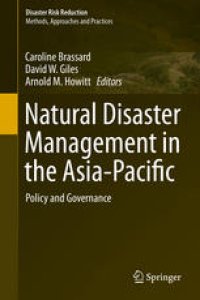
Ebook: Natural Disaster Management in the Asia-Pacific: Policy and Governance
- Tags: Natural Hazards, Landscape/Regional and Urban Planning, Environmental Management
- Series: Disaster Risk Reduction
- Year: 2015
- Publisher: Springer Japan
- Edition: 1
- Language: English
- pdf
The Asia-Pacific region is one of the most vulnerable to a variety of natural and manmade hazards. This edited book productively brings together scholars and senior public officials having direct experience in dealing with or researching on recent major natural disasters in the Asia-Pacific. The chapters focus on disaster preparedness and management, including pre-event planning and mitigation, crisis leadership and emergency response, and disaster recovery. Specific events discussed in this book include a broad spectrum of disasters such as tropical storms and typhoons in the Philippines; earthquakes in China; tsunamis in Indonesia, Japan, and Maldives; and bushfires in Australia. The book aims to generate discussions about improved risk reduction strategies throughout the region. It seeks to provide a comparative perspective across countries to draw lessons from three perspectives: public policy, humanitarian systems, and community engagement.
The Asia-Pacific region is one of the most vulnerable to a variety of natural and manmade hazards. This edited book productively brings together scholars and senior public officials having direct experience in dealing with or researching on recent major natural disasters in the Asia-Pacific. The chapters focus on disaster preparedness and management, including pre-event planning and mitigation, crisis leadership and emergency response, and disaster recovery. Specific events discussed in this book include a broad spectrum of disasters such as tropical storms and typhoons in the Philippines; earthquakes in China; tsunamis in Indonesia, Japan, and Maldives; and bushfires in Australia. The book aims to generate discussions about improved risk reduction strategies throughout the region. It seeks to provide a comparative perspective across countries to draw lessons from three perspectives: public policy, humanitarian systems, and community engagement.